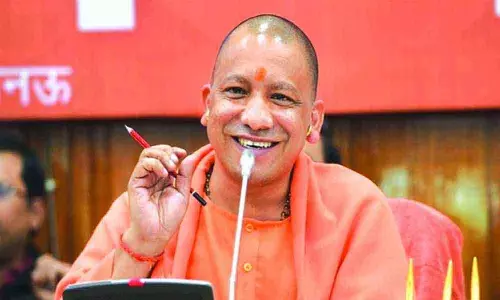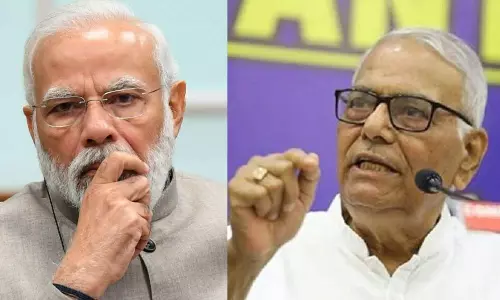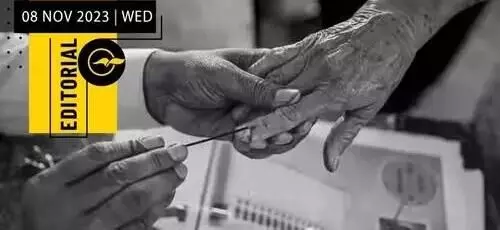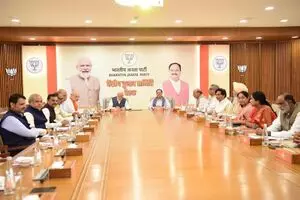
Is democracy in decline?
text_fieldsIt is a fundamental truth that the spirit and vitality of democracy are decisively determined by free, fair and healthy elections. India's experience over the past 75 years bears testimony to the fact that only the outer shell of the democratic system would endure if factors such as money, caste, religion, and nepotism have a greater influence on political parties throughout process of candidate selection and campaigning. When we look back in history, the parliamentary and legislative elections held since India became a Republic till date, even when literacy and education levels were in their infancy, during its initial decades, there was leadership and effective intervention of the founders of a new India. They ensured that the elections were free and fair. It was believed that educational and cultural growth would further strengthen our enlightenment. But looking at the experiences of the 21st century, we are compelled to note that they are quite worrisome and depressing.
This worry becomes more relevant when the picture emerges of the ongoing Assembly elections, which have already started in five states and will end at the end of November. With polls to the 230-seat Madhya Pradesh Assembly just days away, one cannot be blamed for wondering which of themain political parties - the Congress or the BJP - is more committed to Hindutva. The BJP's main campaign weapon is the Shri Ram temple in Ayodhya, which is expected to be inaugurated by Prime Minister Narendra Modi and opened to devotees and visitors by early next year. With the inauguration of the Shri Ram temple, built at a cost of 3000 crore rupees, the propaganda carried by people including Modi is that India will become a complete Hindu nation. What the rulers have to say to the 140 crore Indians is not about practical programs to improve the condition of the 22 crore hungry people or the unemployed. In response to this, what does Kamal Nath, the chief ministerial candidate of the main party in the INDIA alliance, have to say? That the controversial Babri Masjid was opened to Hindus for worship when the Congress Prime Minister Rajiv Gandhi was in office. He also made sweet promises of free visits for the poor devotees once the work is completed and added that he had also made a huge contribution to the construction of the Ram temple! Kamal Nath left out the fact that Congress Prime Minister Narasimha Rao was completely silent when the Babri mosque was demolished on December 6, 1992, which is sure to backfire at some point. However, it can be pointed out that in Madhya Pradesh, which has a population of 7.5 crores, only two seats have been allotted to the seven per cent Muslims in his party's candidate list. There is no need to fear that the Congress will lose their votes because the BJP has reserved zero seats for the religious minorities.
In Rajasthan, which has 200 seats, the Congress says it has allocated 15 seats while the BJP has reserved none for Muslims in its list. But the Congress act is being held up by the BJP as proof of the Congress' Muslim appeasement. In Telangana, which has 119 seats, the Congress is opposing the MIM-BRS alliance by fielding former Indian cricket team captain Mohammad Azharuddin. As the Muslim votes there are fragmented, the possibility of the BJP making gains cannot be ruled out. The list of candidates of all three parties is segregated caste-wise like Reddys, Velamas, Kammas, Brahmins and Scheduled Castes. Pointing out that most of the OBCs are not on the Congress list, the BJP also accuses them of neglecting social justice. In Chhattisgarh, which has 90 seats, the Congress has nominated one Muslim for the sake of it. Naturally, there is not a single Muslim on the BJP list. It is not even news that millionaires have dominated the list of candidates everywhere. What will happen as a result? As seen in Goa, Maharashtra and Karnataka, those who win by pouring in black money will not only offer the invested money but when they offer enough profit, even the loyal will be converted overnight. The strategy of making the lotus bloom through defection is also best practised by the party which has the full support and protection of the Adani-Ambani dynasties. Therefore, there is no guarantee that those who win on the ticket of the main party in the INDIA alliance will not leave their 'hand'. But we can continue working for democracy, secularism and social justice and exercise the right to consent. And also, we can also pray that God will save us.



























